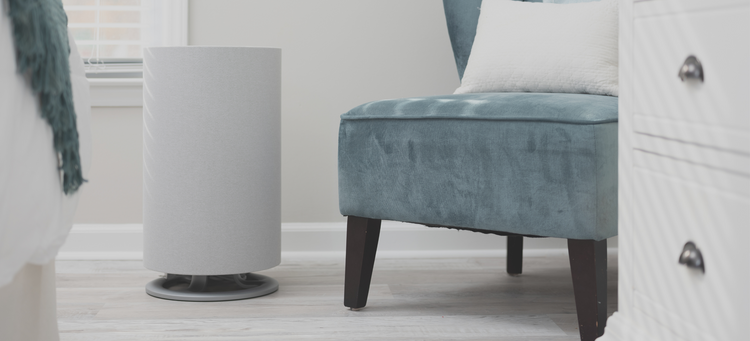How To Choose an Air Purifier: Wildfire Smoke
Wildfire smoke is becoming an increasing threat to our health and safety. Last year alone, the National Interagency Fire Center reports thousands of wildfires in the United States yearly — affecting over millions of acres of land and countless people. These statistics show that wildfire smoke is a threat to the wellbeing of each and every one of us.
In this article, we’re going to take a closer look at the effects wildfire smoke can have on our health, what you can do to protect your family and promote a cleaner, healthier environment in your own home.
All About Wildfire Smoke
Before we find out how an air purifier for wildfire smoke can help safeguard a healthy environment when we are under threat, let’s find out exactly what wildfire smoke is composed of and why it’s bad for our health.
Wildfire smoke is a toxic combination of gases like carbon monoxide and carbon dioxide, water vapor, and minute particles from any material that is being burned. This could be building materials, plants, trees, or anything else that is on fire.
What Causes Wildfire Smoke?
Wildfires are usually the direct result of an unplanned fire that starts in vegetation, most often in rural areas, wildfires and smoke can get out of control quickly.
Wildfires may be ignited by a lightning strike, by human action — for example, by discarding a cigarette — or most commonly due to a combination of weather conditions. Elevated temperatures, wind, and a lack of rainfall over a long period can all increase the likelihood of a wildfire breaking out.
Wildfires near communities pose a threat to people’s homes, lives, and health too. The smoke that results from wildfires can harm you — no matter how healthy you were to start with. We are all vulnerable to the effects of smoke and should all take care to do everything we can to counter them.
The Damage That Wildfire Smoke Can Have On Your Health
Wildfire smoke is toxic. It can make you sick even if you have no existing health issues, or trigger certain conditions like asthma or other respiratory conditions.
You can get sick straight away from breathing in wildfire smoke with symptoms such as:
- Coughing
- Wheezing, difficulty breathing, and shortness of breath
- Sore eyes
- Scratchy throat
- Sinus issues
- Runny nose
- Chest pain
- Headaches
- Asthma symptoms
- Fatigue
- Elevated heartbeat
Wildfire smoke is especially dangerous for people who already have respiratory conditions like asthma or chronic bronchitis, people with heart conditions like coronary artery disease or angina, seniors, children, and pregnant women.
Minimizing The Effect Of Wildfire Smoke With An Air Purifier
An air purifier for wildfire smoke works to both circulate the air in your environment and trap the large and small particles that make up smoke in its filters. As well as trapping the solid debris contained in wildfire smoke, effective filters will also reduce the unpleasant smoky smell.
Activated carbon filters in your air purifier for wildfire smoke are your best bet for getting rid of that unpleasant smoky smell by trapping airborne odor molecules.
How To Tell If An Air Purifier Is Effective Against Wildfire Smoke
An effective air purifier that can clean your air of pollutants like wildlife smoke, as well as dust, mold, and pet dander, must perform strongly in a few different areas.
Let’s start with airflow. To improve your indoor air quality, your purifier needs to create sufficient airflow for the space. So the greater the airflow, the larger the space your purifier is capable of keeping clean. The best air purifier for wildfire smoke will change the air in a room four to five times per hour. This basically means that all of the air contained inside is circulated by the air purifier this many times in 60 minutes.
But this is not the only factor determining an air purifier’s effectiveness. It must also have filters that are specially designed for the job at hand. As we’ve seen above, for smoky environments, carbon filters work best.
Similarly, if you or a family member suffers from asthma, you need a purifier with filters that will trap the smallest particles that trigger symptoms, including dust, pollen, mold spores, and pet dander. It will also be effective at capturing PM2.5 pollution, the tiniest particles that can cause respiratory symptoms.
Knowing the pros and cons of both HEPA and carbon filtration is important in understanding how to get the healthiest indoor air during wildfire season. HEPA filters only target particulate matter like dust and pollen while carbon filters are needed to address smoke.
Here are the best air purifiers for wildfire smoke.
The Best Air Purifiers For Wildfire Smoke
The best air purifier for wildfire smoke combines quality with effectiveness. When it comes to air purifiers, quality starts with high efficiency air filters and a strong motor, which cleans smoke particles from the air around you.
For effectiveness, look for carbon filters in your air purifier. The carbon filter uses charcoal treated with oxygen, opening up tiny spaces between the carbon atoms. This allows effective adsorption (capturing gas and liquid molecules) of the particles that make up smoke. It’s undoubtedly the best air filter for wildfire smoke.
Our TrueCarbon™ air purifiers have heavy duty carbon filtration that specifically targets smoke and smoke odors. Most carbon filters are very thin and don't provide the level of air cleaning that's needed to filter out indoor smoke. The TrueCarbon™ filter is over 3 pounds of densely packed carbon fit into a frame that's 2 inches deep guaranteeing effective filtration against wildfire smoke.







